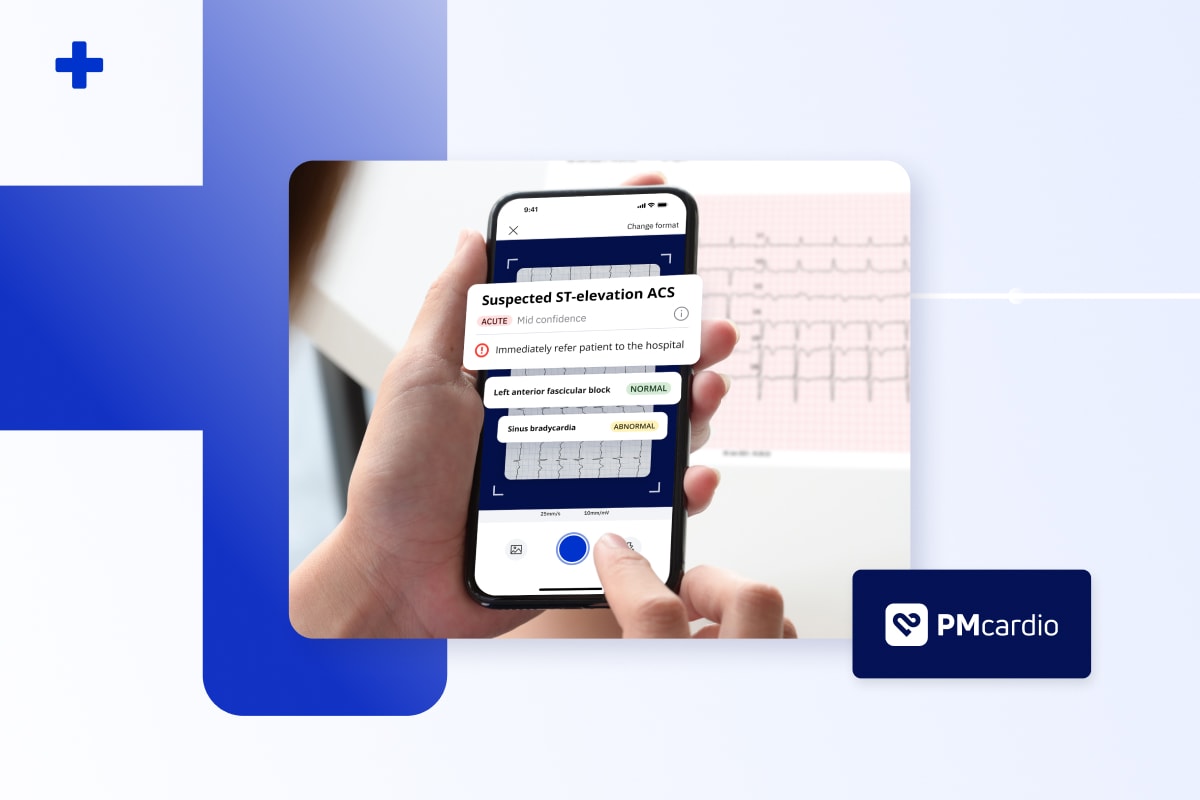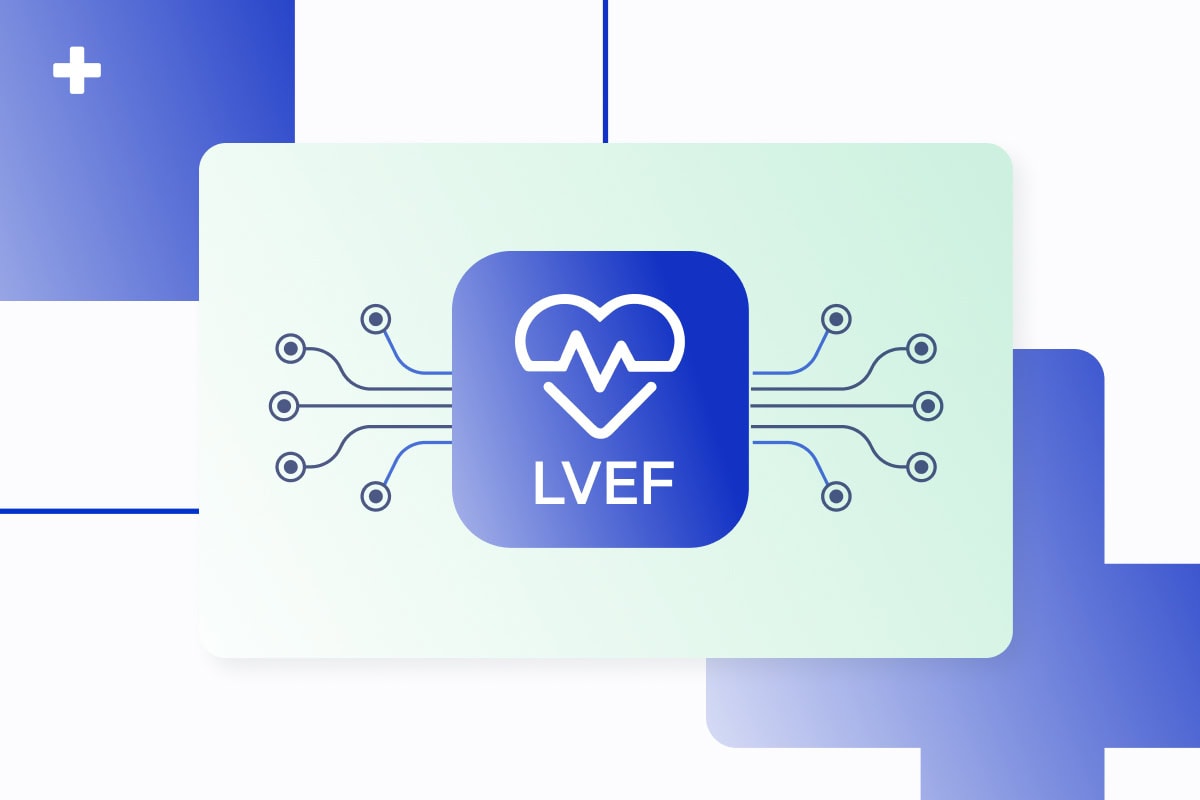In the fast-paced world of modern medicine, time and accuracy are paramount, especially for cardiovascular diagnoses. Electrocardiography (ECG) remains a crucial diagnostic tool for assessing heart function, detecting abnormalities, and guiding treatment decisions. It is estimated that 1.5 million to 3 million ECGs are performed worldwide every day.
This article explores how AI ECG interpretation differs from traditional ECG automation based on conditional-based algorithms (if-then-else) that have been used since the 1970s. We also introduce PMcardio, an AI-powered interpretation platform clinically validated and certified to diagnose 39 cardiovascular diseases from any 12-lead ECG strip in seconds.
AI-powered ECG Reader vs Automated ECG Interpretation
As technology continues to shape the healthcare landscape, the emergence of automated ECG interpretation has opened new doors for efficiency and precision. The latest advances in machine learning algorithms and deep neural networks have enabled the rise of AI-powered ECG interpretation, which no longer carries the limitations of rigid conditional-based algorithms (if-then-else) that remain relatively inaccurate despite their maturity.
With AI-based solutions like PMcardio, AI ECG interpretation utilizes machine learning and deep neural networks, allowing it to to learn from the data and create its own rules for interpreting ECGs. No patterns are directly given as input; any patterns are learned in the process of training.
By crunching millions of previous ECGs in a matter of hours, the machine can spot and learn even very subtle patterns possibly missed by the human eye.
To illustrate this on a practical example, PMcardio’s deep neural network (deep learning algorithm) model has been trained on a total of 931,344 standard 12-lead ECGs from 172,750 patients to detect 39 individual diagnoses of heart rhythms, heart blocks, infarctions, hypertrophies, and ectopies among others.
Our CMO, Robert Herman, MD, discusses the future roadmap for leveraging AI ECG interpretation on the Mayo Clinic podcast.
How AI-powered ECG Reader Works
PMcardio is an advanced ECG reader equipped with state-of-the-art AI technology and machine learning algorithms. It is designed for healthcare professionals, including general practitioners, nurses, paramedics, and other medical personnel. It can digitize and then interpret any 12-lead ECG strip within seconds, streamlining the ECG interpretation process. Clinically tested and certified, It provides rapid, accurate results and offers a treatment plan based on the latest ESC guidelines within seconds.
Compared to fixed algorithms standardly deployed with ECG devices, By learning from millions of complex cases and patient outcomes across multiple cohorts, the AI algorithm in the ECG reader app can recognize even subtle patterns that human experts and condition-based algorithms might miss.
With PMcardio, you can expect the following:
1.) Read and Diagnose your 12-lead ECG Waveform in Seconds
Gone are the days of laborious manual ECG interpretations. Thanks to PMcardio, the entire process can be automated, providing instant analyses and significantly reducing waiting times, leading to optimized patient care. This unique ECG reading app can diagnose and suggest personalized and guideline-adherent treatment for 39 different cardiovascular diseases within 5 seconds, matching a skilled cardiologist’s precision.
Latest International OMI AI ECG Model validation published in European Heart Journal:
European Heart Journal: Clinical Validation Study of the PMcardio OMI AI Model
2.) ECG Reader with Accuracy Matching Expert Cardiologist
Imagine having an expert cardiologist with three decades of experience at your disposal—that is what we offer. Leveraging AI and machine learning, PMcardio’s algorithms have been trained on an extensive data set of a million ECG cases, resulting in superior diagnostic precision.
PMcardio’s deep neural network (deep learning algorithm) model has been trained on 931,344 standard 12-lead ECGs from 172,750 patients to detect 39 individual diagnoses of heart rhythms, heart blocks, infarctions, hypertrophies, and ectopies.
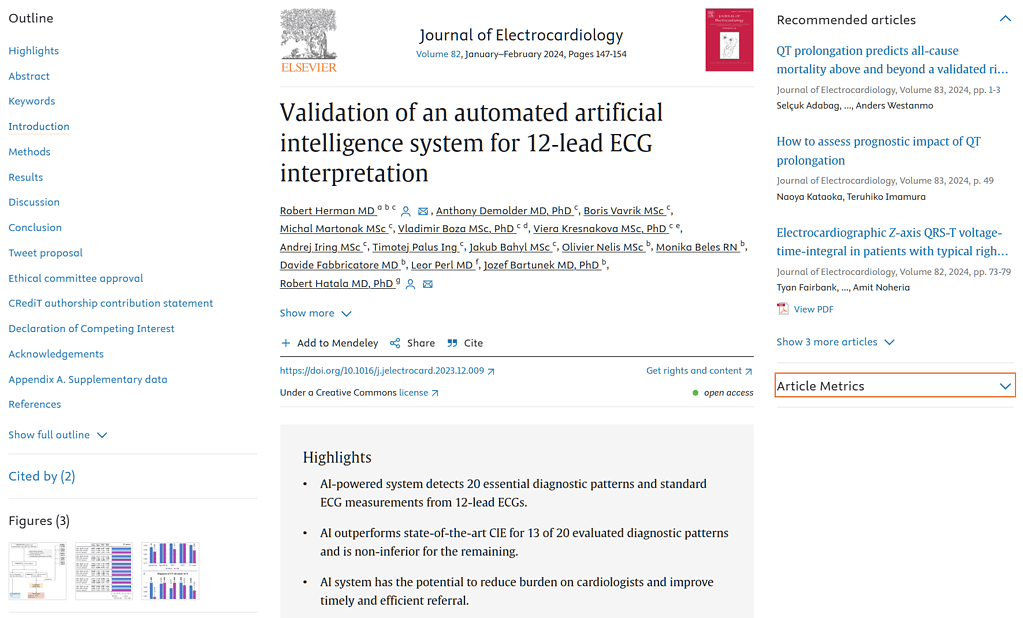
3.) Clinically Approved and Certified Medical Device
PMcardio is a clinically validated CE-certified Class II(b) Medical Device (EU MDR) trusted by over 25,000 healthcare professionals across Europe. Available in the United Kingdom, Germany, France, Italy, Netherlands, Belgium, Switzerland, Poland, Austria, Portugal, Ireland, Croatia, Cyprus, Luxembourg, Malta, and Liechtenstein. Additionally, we are in the process with the FDA authorities to become clinically approved for use in the United States.
PMcardio: International Clinical Validations & Research
PMcardio: ECG Reader Redefining ACS Patient Pathway
Every year, emergency departments in Europe and the USA receive over 50 million patients experiencing chest pain. Regrettably, the current standard of care, which relies on ST-elevation criteria in ECG readings, fails to accurately detect acute coronary occlusion in 25-30% of NSTEMI patients, thereby delaying crucial interventions. Hospitals also suffer from 15-20% false positive cath lab activation rates due to false positive ST-elevation criteria.
To address this issue, integrating Artificial Intelligence (AI) into ACS pathways represents a significant advance in precision medicine, specifically tackling the challenge of providing accurate early diagnoses of heart conditions.
An international study featured in the European Heart Journal – Digital Health clinically validates the OMI AI model of PMcardio, an AI-powered ECG Interpretation platform that significantly enhances the detection of acute occlusive myocardial infarction, setting new diagnostic standards in emergency cardiac care.
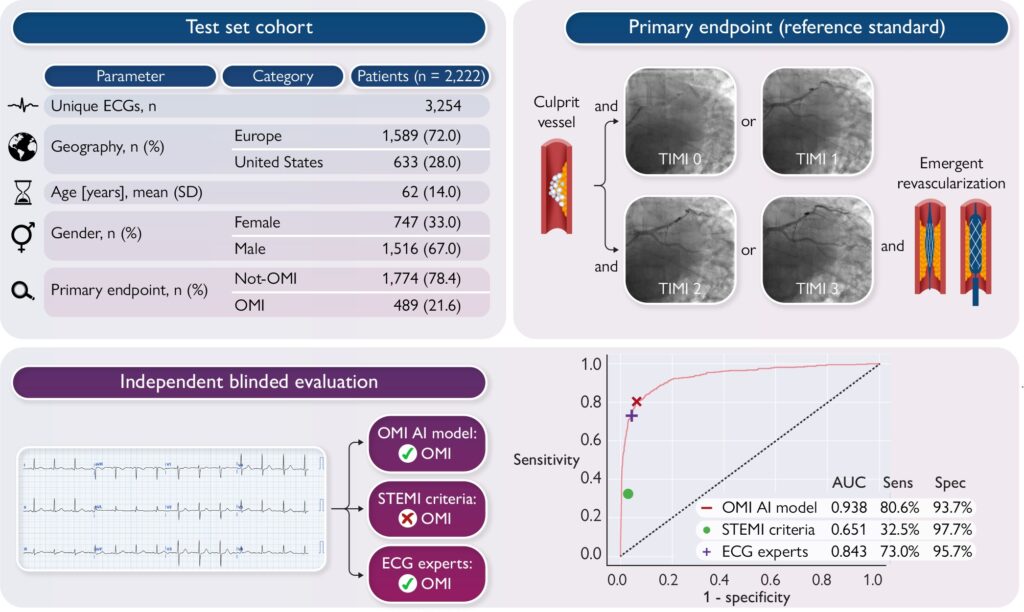
The study further reveals that the AI ECG model exhibits superior performance compared to conventional STEMI criteria and expert assessments. With an Area Under the Curve (AUC) of 0.938 for detecting occlusive myocardial infarctions, it achieves an accuracy of 90.9%, a sensitivity of 80.6%, and a specificity of 93.7%. These metrics exceed traditional criteria in identifying the most subtle forms of STEMI and STEMI equivalents and the capabilities of experienced ECG experts, representing a significant leap forward in cardiac diagnostics.
Bridging the Expertise Gap in Emergency Medical Services with AI ECG Readers
Inadequate ECG interpretation training among emergency medical staff can lead to critical misdiagnoses and severe patient care consequences, including inappropriate treatments and potentially fatal outcomes. AI ECG interpretation streamlines this process by allowing emergency personnel to capture a snapshot of any 12-lead ECG strip with their smartphones, with the AI promptly providing a comprehensive interpretation.
Can you interpret this ECG?
It’s 11:30 PM, and a 67-year-old male patient presents with two hours of ongoing chest pain. Would you refer for an emergent coronary angiography?
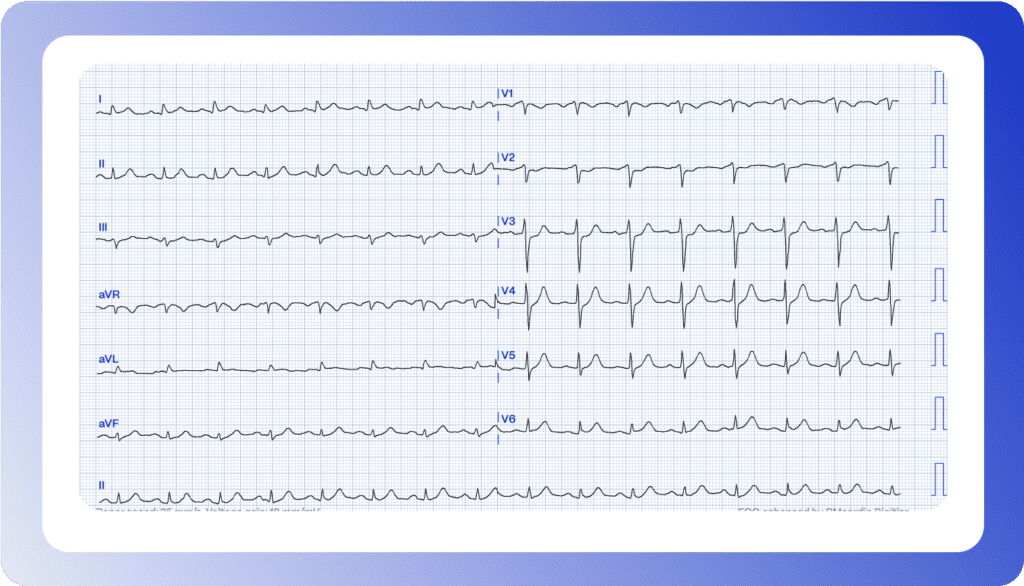
AI ECG: A Paradigm Shift in Cardiac Care
The integration of AI in cardiology and ECG analysis has redefined benchmarks in cardiac management. The PMcardio platform enhances diagnostic accuracy and speeds up medical responses, potentially saving lives and improving care for millions of patients worldwide. As a certified Class IIb medical device, it quickly digitizes and analyzes any 12-lead waveform strip.
Are you a healthcare professional eager to test its capabilities? Sign up now and claim your five free ECG reports—no credit card required.
Read your next ECG with AI
Be part of a future where cardiac care is smarter, faster, and more accessible. Sign up now and claim your 5 free ECG reports – no credit card needed.

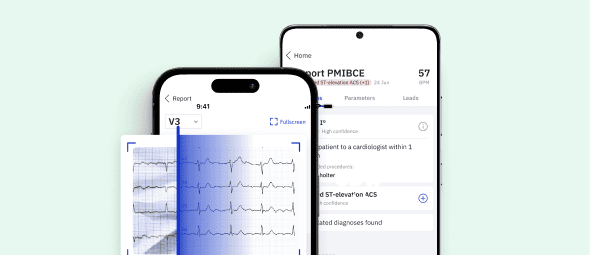
FAQ: AI-powered ECG Reader App
How does AI-powered ECG interpretation work?
AI utilizes machine learning and deep neural networks to interpret ECGs. Unlike traditional methods that rely on predefined rules and pattern recognition, AI systems learn from large datasets of previous ECGs, identifying patterns and correlating them with outcomes. This allows AI to detect subtle abnormalities that might be missed by human eyes.
What is the AI on the ECG?
Artificial intelligence (AI) applied to electrocardiogram (ECG) interpretation employs advanced machine learning and deep learning techniques. This AI-driven approach excels in pattern recognition, rapidly identifying subtle cardiac abnormalities from vast datasets of ECG records. Unlike traditional methods that depend on static rules, AI algorithms continually learn and adapt, improving their diagnostic accuracy over time. This not only speeds up the diagnostic process, which is crucial in urgent care settings, but also supports clinicians by providing precise, scalable, and automated ECG interpretations, thereby improving patient outcomes and broadening access to expert-level cardiac care.
What app reads ECG?
PMcardio is an AI ECG interpretation app that reads ECGs. It quickly and accurately diagnoses up to 39 cardiovascular conditions from any 12-lead ECG. Certified for use by healthcare professionals, PMcardio enhances cardiac care by providing reliable diagnostics and treatment recommendations within seconds.
Can ChatGPT read an ECG?
While ChatGPT-4 Plus has shown some capability in interpreting ECG images in test settings, it is not a reliable tool for clinical ECG analysis. The interpretation of ECGs demands precise, expert evaluation, and AI chatbots like ChatGPT do not meet the necessary standards for medical diagnostics. For accurate and dependable ECG interpretation, consider using specialized AI solutions like PMcardio, designed to deliver expert-level diagnostics with high accuracy and speed.
